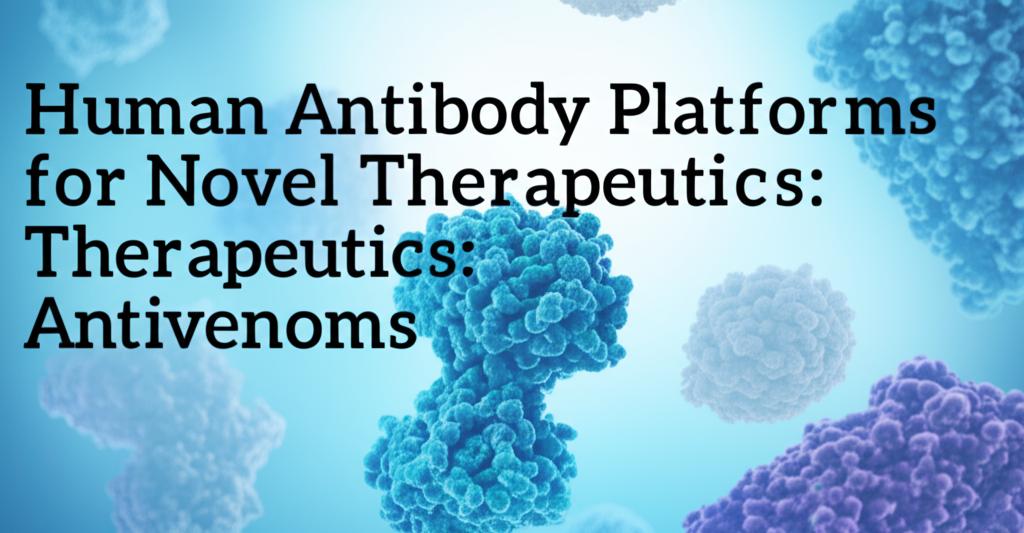Human antibody technologies represent a cornerstone of modern drug development, offering therapies with reduced immunogenicity and enhanced efficacy compared to earlier antibody types. While initially gaining prominence through monoclonal antibodies (mAbs) for various conditions, the field has significantly evolved. Advanced discovery platforms are now enabling the creation of sophisticated, next-generation therapeutics tackling a widening array of complex human diseases well beyond the scope of applications like antivenoms.
Sophisticated Discovery Platforms Drive InnovationThe engine behind novel antibody therapeutics lies in continuously improving discovery platforms. These technologies are designed to identify and isolate human antibodies with desired properties like high affinity and specificity:
- Advanced Phage Display: This established technique remains highly relevant. Modern phage display libraries boast enhanced diversity, incorporating synthetic and natural variations that mirror the human immune system more closely. Coupled with high-throughput screening, this allows for rapid identification of candidates, even against challenging targets.
- Transgenic Animal Models: Animals genetically engineered to produce fully human antibodies are a major advancement. By incorporating human immunoglobulin genes and suppressing endogenous antibody production, these models (like mice, rats, and chickens) generate diverse antibody repertoires directly in a human format, bypassing the need for later humanization steps. Technologies like CRISPR/Cas9 have further refined the creation of these models, shortening development timelines.
- Single B-Cell Screening: Capturing the natural pairing of heavy and light antibody chains is crucial for maintaining antibody function. Single-cell technologies, often utilizing microfluidics, allow researchers to isolate and analyze individual B cells producing antibodies of interest with high precision. This is particularly valuable for rapidly identifying potent antibodies against evolving targets, such as emerging infectious disease pathogens.
- AI and Machine Learning Integration: Artificial intelligence is revolutionizing antibody discovery and design. AI algorithms analyze vast datasets to predict antibody-antigen interactions, guide library design, optimize candidates for enhanced stability and manufacturability, and even predict potential immunogenicity. This computational approach significantly accelerates the discovery cycle and helps identify antibodies against previously intractable targets, often leading to non-intuitive but highly effective molecular designs. Specialized platforms now integrate AI with automated high-throughput functional screening in a closed loop, dramatically increasing the number of candidates that can be designed, produced, and tested in short timeframes.
These platforms enable the development of antibody formats beyond traditional mAbs, offering novel mechanisms of action:
- Bispecific and Multispecific Antibodies (BsAbs): Engineered to bind two or more different targets simultaneously, BsAbs can bridge immune cells (like T cells or NK cells) to tumor cells, block multiple signaling pathways concurrently, target cells with greater specificity, or modulate immune checkpoints more effectively. Their applications are rapidly expanding in oncology and increasingly in autoimmune diseases.
- Antibody-Drug Conjugates (ADCs): These therapies link potent cytotoxic drugs directly to antibodies. The antibody serves as a targeting mechanism, delivering the payload specifically to diseased cells (often cancer cells expressing a particular antigen), thereby minimizing systemic toxicity.
- Nanobodies and Single-Domain Antibodies (sdAbs): Smaller antibody fragments derived from heavy-chain-only antibodies (found in camelids) or engineered from human antibodies offer unique advantages, including enhanced tissue penetration, stability, and the potential to access different epitopes, including those on challenging targets like G protein-coupled receptors (GPCRs) and ion channels.
- Other Formats: Platforms also support the discovery of antibodies for CAR-T cell therapies, immunocytokines (antibody-cytokine fusions), and immunotoxins, further expanding the therapeutic toolkit.
While oncology remains a dominant area, driven by the need for targeted therapies against cancer cells and modulation of the tumor microenvironment, human antibody platforms are enabling breakthroughs across diverse fields:
- Autoimmune and Inflammatory Diseases: Antibodies targeting specific immune cells (e.g., B cells) or inflammatory mediators (like cytokines) are used to treat conditions such as rheumatoid arthritis, psoriasis, and inflammatory bowel disease. Next-generation formats like BsAbs offer potential for more selective immune modulation.
- Infectious Diseases: Human mAbs provide potent tools for both preventing and treating viral and bacterial infections, particularly valuable against pathogens resistant to conventional drugs or where vaccines are unavailable. Platform speed is critical for responding to emerging outbreaks.
- Neurodegenerative Diseases: Targeting pathological proteins involved in diseases like Alzheimer's is an active area of research, though challenges like crossing the blood-brain barrier remain.
- Metabolic and Cardiovascular Diseases: Antibodies are being explored to target pathways involved in conditions like dyslipidemia or heart disease.
- Rare Diseases: Antibody platforms can potentially address diseases with specific molecular targets that were previously undruggable.
Human antibody discovery platforms have matured significantly, moving far beyond early techniques. The integration of transgenic animals, sophisticated library designs, single-cell analysis, and powerful AI tools allows for the rapid development of highly specific and potent human antibodies. These platforms are not only refining existing therapeutic approaches but are crucially enabling the design and production of next-generation formats like bispecifics and ADCs. This continuous innovation is expanding the reach of antibody therapeutics into increasingly diverse and complex disease areas, promising more effective and personalized treatments for patients worldwide.

